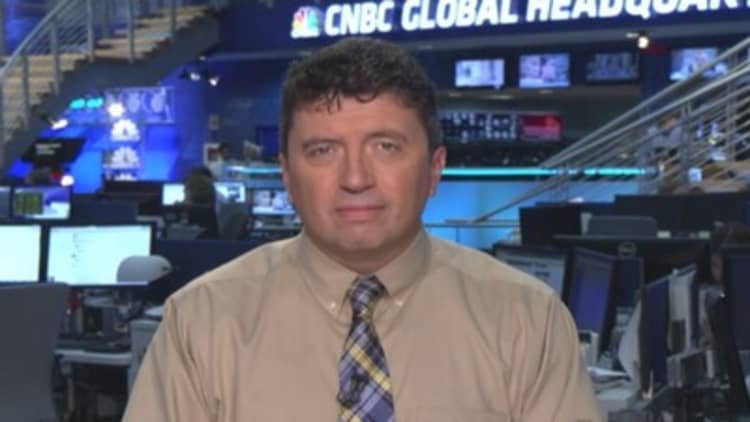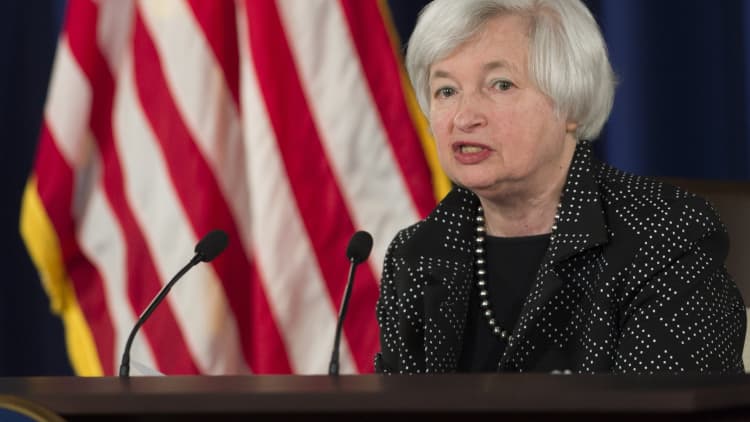
A second-quarter economic rebound did nothing to change the outlook of the Federal Reserve, which stayed the course Wednesday with ultra-easy monetary policy.
While the U.S. central bank voted to cut its monthly bond-buying program another $10 billion, it left its short-term interest rate target near zero and expressed only tepid encouragement about growth. The Fed also voted to continue to reinvest proceeds from maturing bonds as its balance sheet swells near the $4.5 trillion mark.
Market reaction was modestly positive to the statement with stocks shaving losses.
There was some thought that the meeting could feature dissent, particularly from Dallas Fed President Richard Fisher, who penned an op-ed piece in the Wall Street Journal earlier this week indicating his dissatisfaction with ultra-easy monetary policy from the U.S. central bank. After the Fed released its meeting statement, several analysts noted "tension" within the language.
However, the sole "no" vote actually came from Philadelphia Fed President Charles Plosser, who said the committee was not adequately taking into account the economic progress. He "objected to the guidance indicating that it likely will be appropriate to maintain the current target range for the federal funds rate for 'a considerable time after the asset purchase program ends,' because such language is time dependent and does not reflect the considerable economic progress that has been made toward the Committee's goals," the meeting statement read.
"The tension inside that meeting must have been significant. … My guess is at turning points it's always hard in that room," said Bob Doll, chief equity strategist at Nuveen Asset management.
Read MoreFed up? Yellen facing challenges from within
The decision came the same day the Department of Commerce reported that gross domestic product increased 4 percent in the second quarter on an annualized basis. Perhaps more importantly, the report indicated that real personal consumption expenditures—part of the Fed's key inflation measure—increased 2.5 percent.
However, the FOMC gave inflation only modest recognition in its statement.
"Inflation has moved somewhat closer to the Committee's longer-run objective. Longer-term inflation expectations have remained stable," the statement said.
Market reaction was modestly positive to the statement with stocks shaving losses.
"The market with the GDP number saw that as a sign that maybe they were going to give us a little bit more guidance about being more aggressive, but that didn't come," said Todd Hedtke, vice president of investment management at Allianz.

Pimco CIO Bill Gross, who runs the world's largest bond fund, said the Fed is probably looking past both unemployment—currently at 6.1 percent, below the Fed's 6.5 percent target—as well as inflation and instead to wages. Gross expects salary gains are still below the level that Fed Chair Janet Yellen deems desirable before raising rates.
"Until that happens, until you see a jump to 3 percent, I don't think Janet Yellen and the Fed are really going to blink from their current dovish posture," he said.
The main clue in the statement may have come from the phrase "underutilization of labor resources."
"The underlying question is unemployment," Hedtke said. "Even though the overall unemployment rate has continued to come down, if you look at wage growth that is still below where they probably want it."
The committee did note that "the likelihood of inflation running persistently below 2 percent has diminished somewhat."
"The next time we see forecasts from FOMC measures, they're going to be bringing forward rate hikes," said David Kelly, chief global strategist at JPMorgan Funds. "Eventually I think the market itself is going to bring forward its expectation of rate hikes."


